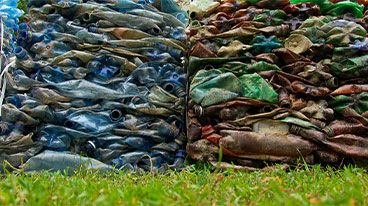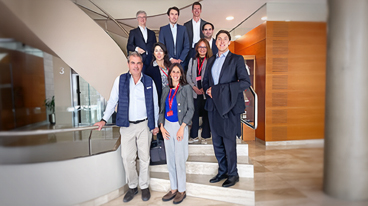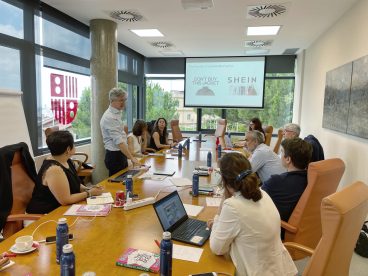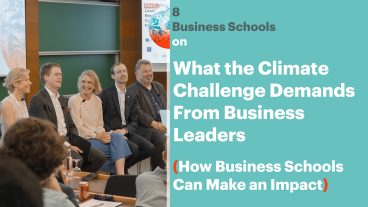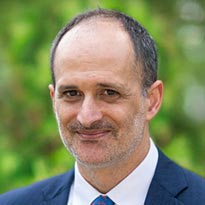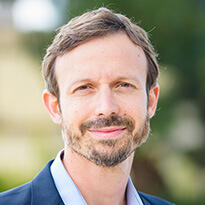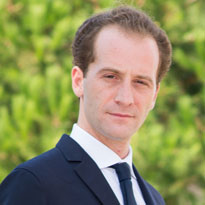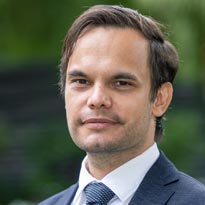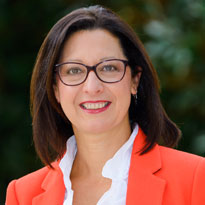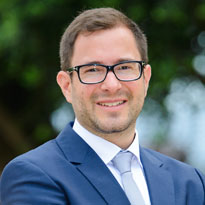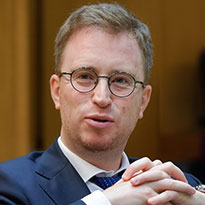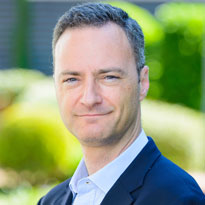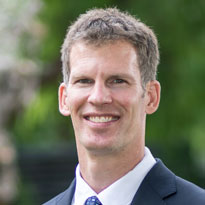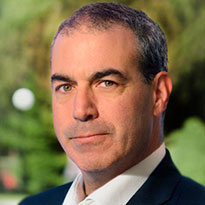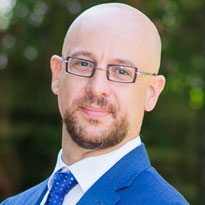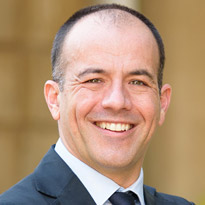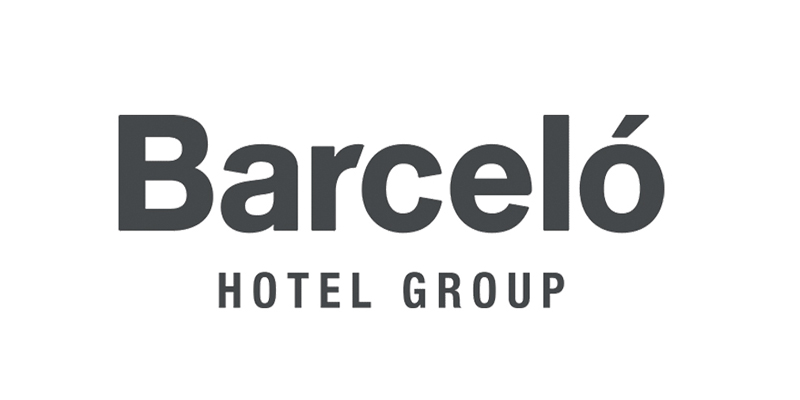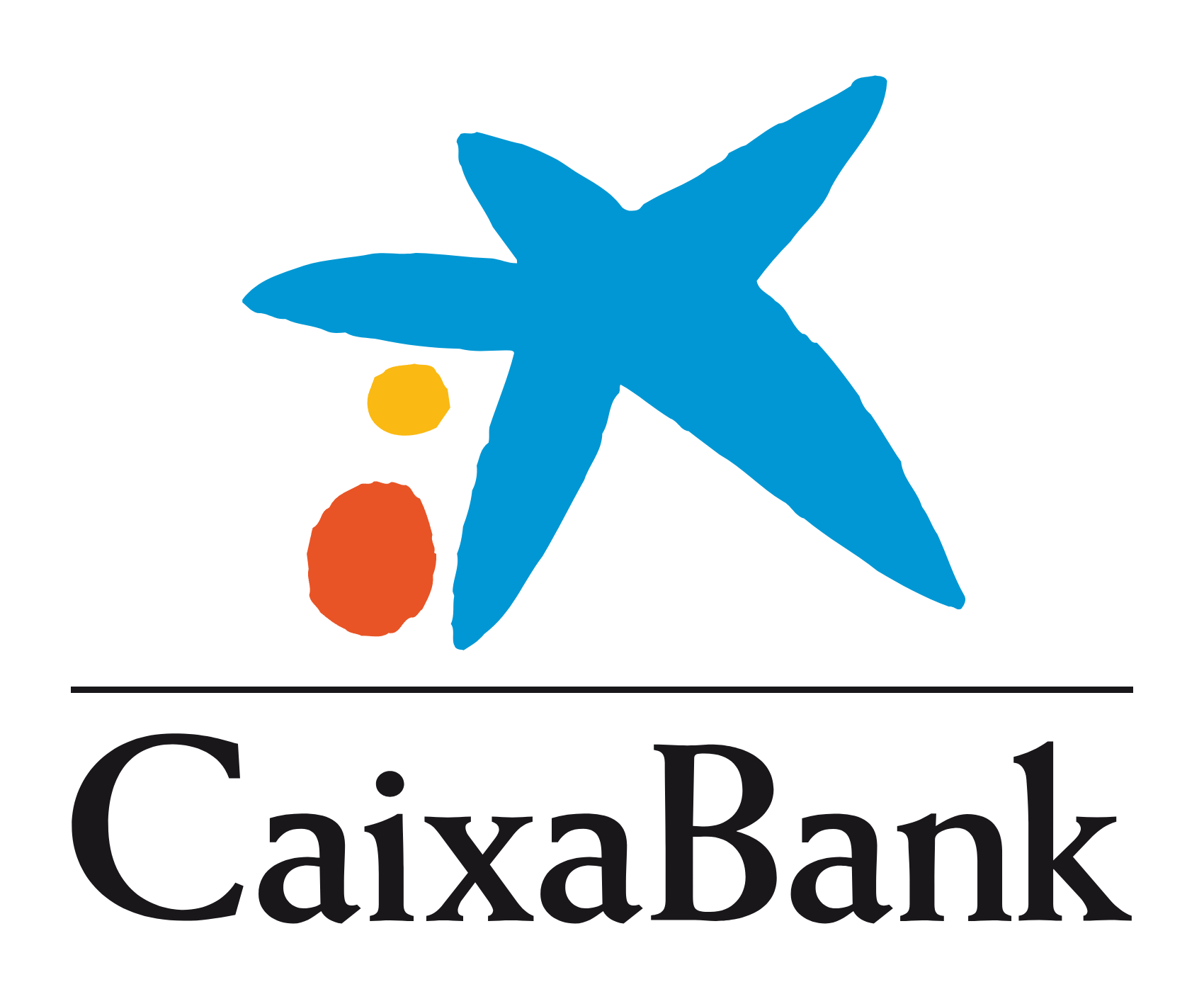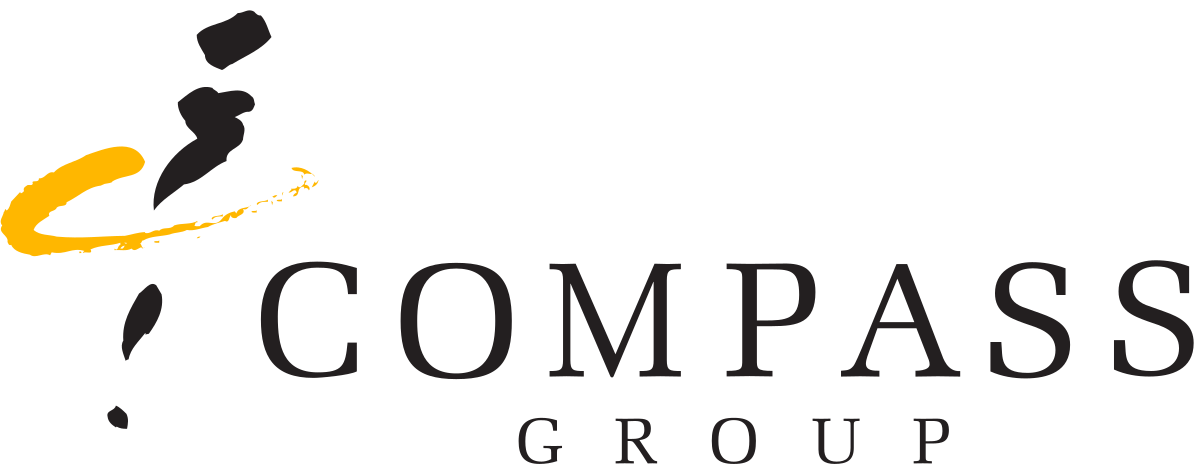Institute for Sustainability Leadership
Knowledge made purposeful
The Institute for Sustainability Leadership is a Center of Excellence that facilitates knowledge exchange and enables multisectoral societal experiences for measurable progress toward a more regenerative economy. Our ecosystem prompts thought leaders across academia, business, research, finance, civil society, government, and media to create social, environmental and economic value for their organizations and for society.
We believe that a more enlightened form of capitalism, also known as ‘stakeholder capitalism’, is not only possible but is already happening across the global economy. Sustainability is already changing dominant business models, and IESE recognizes that business schools play a fundamental role in developing leaders that take an active role in helping us achieve a more prosperous and equitable society.
The Institute for Sustainability Leadership contributes to IESE’s mission of developing leaders that strive to have a deep, positive and lasting impact on people, companies and society through knowledge and purpose. We are moving from awareness to a call-to-action approach by encouraging corporate citizens to meet high standards and to do good.
The Institute for Sustainability Leadership is a central hub within IESE encompassing all internal and external sustainable initiatives. These initiatives form an ecosystem made up of a growing body of research. This ecosystem powers other platforms and initiatives at IESE including Cities in Motion and the Africa Initiative, as well as alliances with other European business schools, such as Business Schools for Climate Leadership.
IESE Insight published a special report providing an inspiring and in-depth summary of the key outcomes of the event IESE’s 2021 Global Alumni Reunion, when high-profile executives and thought leaders were focused on understanding how organizations can develop the SustainAbilities needed to tackle sustainability challenges.
There is growing consensus that novel strategies are needed to address the grand challenges we face as a global society. Climate change, poverty, global health, social inequality and racial justice, among others, are complex problems, characterized by radical uncertainty.
Addressing these challenges will entail technological innovation, but even more importantly, it will require deep institutional transformation in the financial, corporate and public sectors, which implies profound changes in corporate strategies, business models, financial approaches, investment practices, accounting rules, public policies and consumer behavior. Indeed, the transformation will require a rethinking of the very role of business in society and a shift from just attempting to minimize the negative social and environmental impacts of business to proactively leveraging business as a force for good in society.
The Institute advances interdisciplinary research on this transformation to help companies, and their stakeholders, navigate the transition to a more sustainable form of capitalism.
Join our community!
Subscribe now to receive the latest news about our sustainability events.
Research pipeline in sustainable leadership.
- Climate Change Finance. This program is exploring the relationship between common ownership and CO2 emissions, and the relationship between California wildfires and mortgage delinquency and foreclosure. (José Azar, Carles Vergara)
- Green Investment Strategies. This project studies whether public pressure affects public companies’ green investment mix (i.e., acquisition of green targets vs. internal green investments, divestitures of brown assets, etc.). (Pietro Bonetti)
- Impact Investing in Disadvantaged Urban Areas. This project studies how impact investing influences firm performance and social impact in vs. outside urban disadvantaged areas. (Romain Boulongne)
- Impact Investing. This project explores the integration of social impact in the investment practices of early-stage private equity investors. Building on ethnographic research on investment teams in three funds in Europe, this project aims at understanding investment practices in the field. (Fabrizio Ferraro)
- Shareholder Engagement and Deliberative Corporate Governance. This project explores the practices through which investors engage directly with the corporations in which they invest, to promote better ESG performance. It aims to understand what leads to more effective engagement, with a focus on deliberative practices. (Fabrizio Ferraro)
- The Rise of ESG Investing. This project is exploring the rise of ESG investing globally, studying its social and national antecedents, and its consequences in terms of corporate environmental performance. (Fabrizio Ferraro, John Almandoz)
- Trading of Emission Allowances and Financial Frictions. The project examines the role of financial frictions on the trading of emission allowances, including the impact of liquidity needs and accounting loss avoidance, which have implications for the efficacy of carbon markets. (Gaizka Ormazabal)
- Why Institutional Investors Request Climate Related Disclosures. This project examines whether institutional investors who sign up to the CDP – the world leading repository of corporate climate risk information – do so for genuine reasons or merely as a marketing front (i.e., greenwashing). (Igor Kadach, Gaizka Ormazabal)
- Acquisitions of Sustainable Firms. The rise of mergers and acquisitions (M&A) of sustainable targets brings up key questions, such as: to which extent do these deals differ from mainstream M&A? What is their impact on target stakeholders? In particular, how do customers react? This project explores these issues by investigating hundreds of acquisitions of sustainable brands in the consumer packaged food & beverage industry, leveraging a transaction-level database that tracks the purchases by tens of thousands of households of millions of products across the United States. (May-Anne Very)
- Can Mandatory Disclosure Help Clean Up the Environment? This project studies whether targeting corporate activities that have dispersed environmental externalities with disclosure regulation to create public pressure reduces their environmental impact. (Pietro Bonetti)
- CEO Activism. In recent years, CEOs have increasingly taken public stances on current political issues, including topics related to sustainability. This project aims to explain this recent rise in CEO activism and its underlying structural, institutional, and psychological underpinnings. (Sebastian Hafenbrädl)
- Changes in the Energy Sector. The energy sector is undergoing a fundamental change as the world economies are transitioning from a carbon-based economy to a renewables-based one. This project will investigate how the changes in regulations, technology and economic fundamentals will transform the energy value chain up, mid and down-stream. (Massimo Maoret)
- Circular Economy in the Apparel Industry. This project explores what might help promote a circular economy in the apparel industry. In one study we study the impact of product variety on the environmental impact of a clothes rental business model; in another, which type and degree of operational transparency (i.e., what is communicated to the public) best encourages consumers to return their used clothes in retailer take-back programs. Finally, we study how consumers perceive the value of eco-labeled products (e.g., organic or Fair Trade) and whether that perception spills over to conventional products. (Anna Sáez de Tejada Cuenca)
- Crossovers between Sustainability Dimensions of Fashion Products: From Consumers’ Perceptions to Reality. Do consumers believe that clothes with an environmental sustainability attribute (e.g., organic cotton or recycled fibers) are more likely to have been produced in safe, compliant factories, and vice versa? Are fashion products that are sustainable in one dimension (e.g., made with organic cotton) actually sustainable in other dimensions (e.g., made in a compliant factory)? Answering these questions with solid data will serve both to help retailers market their products more effectively and to reduce corporate greenwashing. (Anna Sáez de Tejada Cuenca)
- Environmental Disclosure. This project explores the determinants and consequences of climate related corporate disclosure. Climate related disclosure is not universally mandated. As a result, relatively few firms include relevant information in their financial filings, making it difficult for investors to assess the climate risk to their portfolios. Investors respond to that problem with increasing number of environmental engagements with portfolio companies. (Igor Kadach)
- Environmental Entrepreneurship and Institutional Change. This area assesses how sustainable entrepreneurs design new industry norms, property rights arrangements, or influence policy to change the payoffs of environmentally responsible initiatives and the competitive dynamics of their industries. It explores how entrepreneurs effectively create opportunities to address environmental challenges that would otherwise not be economically feasible. (Desirée Pacheco)
- Executive Compensation Tied to ESG Performance: International Evidence. This project examines the extent to which publicly traded companies incorporate ESG metrics in executive pay and the resulting impact on firm ESG performance. (Igor Kadach, Gaizka Ormazabal)
- Green Innovation. This project explores how green technology spillovers –unintentional flows of knowledge stemming from the R&D efforts of technologically close firms– influence a firm’s environmental performance. (Pascual Berrone)
- Green Public Procurement. This line of work investigates the extent to which mandatory and voluntary regulations interact with organizations’ readiness in the procurement process linked to climate change. (Pascual Berrone, Joan Enric Ricart)
- Inside-out and Outside-in Perspectives on Corporate Purpose. This project explores how existing management theories fail to help us understand the unexpected rise in attention from both scholars and practitioners towards corporate purpose. Inside-out purpose is a channeling of the passion and commitment employees feel for their purpose towards stakeholder needs; outside-in purpose is society and external stakeholders urgently calling on the organization to live up to its responsibilities. (John Almandoz)
- Leadership, Organizational Culture, and ESG Performance. Starting from a computational approach to quantify organizational culture in a large sample of companies, this project explores the relationship between culture and (1) corporate misconduct, (2) media reputational risk, and (3) ESG performance. (Fabrizio Ferraro)
- Making Sustainability Real. Many companies have recently adopted bold sustainability targets, and CEOs are increasingly using the language of sustainability in their speeches and strategy statements. An interesting question is the degree to which these commitments are backed up by real programs and changes to the firm’s business fundamentals, such as their choices concerning energy use, product development, value proposition and supply chain to name a few. This stream of activity is focused on developing industry specific case studies highlighting the struggles that managers have in making sustainability real. (Mike Rosenberg)
- New Opportunities. The transition to a low carbon economy requires the re-building of much of the world’s infrastructure as well the creation of entirely new business areas. How to assess these opportunities pushes the limits of traditional business planning and requires the development of new tools and frameworks. (Mike Rosenberg)
- Orchestration of Emerging Ecosystem, the New PPPs in Cities. Public-Private Partnerships (PPP) are morphing into the orchestration of emerging ecosystems that require a new ecosystem strategy and a new relational governance to overcome the barriers for its deployment. (Pascual Berrone, Joan Enric Ricart)
- Pricing and Carbon Offsets. Businesses in the retail industry (fashion, food, electronics, etc.) are increasingly committed to sustainability. As part of that process, businesses either claim or target net-zero emissions through carbon offsets. But how does a brand make the transition to net-zero emissions? And more fundamentally, how does a brand price a product while buying carbon offsets? This project provides empirical evidence for the implementation of carbon offsets. (Diego Aparicio)
- Regulating Sustainability Reporting to Achieve Net-Zero Emissions by 2050. Corporate reporting is at the center of the current debate on how to curb carbon emissions. Nonetheless, the financial information traditionally provided by firms is deemed insufficient to understand the impact of corporate activities on the environment. As governmental and civil entities work to regulate sustainability reporting, they face important challenges. What kind of (non-financial) information should firms be required to disclose? How can sustainability reporting standards be enforced? And what will the “real effects” of disclosure regulation have on companies? (Gaizka Ormazabal)
- Relational Business Model Design. This project explores the extent to which novel business models (e.g., digital platforms, sharing economy companies) are able to create (and distribute) value to multiple stakeholders within a given community. It also attempts to understand the sources and motives of resistance these businesses face in specific settings. (Joan Enric Ricart, Pascual Berrone)
- Responding to Competitive Environments. This work explores how firms’ competitive environments and their strategic motivation are not only relevant to their decision to undertake sustainability practices, but also shape how they are influenced by the demands of environmental activists. (Desirée Pacheco)
- Small Firms and Industry-wide Sustainability Change. This study examines the role of small and medium-sized craft firms in influencing change towards sustainability practices in the apparel industry. By educating consumers and engaging in cultural work to legitimize their practices, these firms are able to authentically generate demand for sustainable apparel and inspire larger industrial firms to undertake similar practices. (Desirée Pacheco)
- Social Conditions and Industry Growth. This research stream explores how emerging industries in sustainability-related sectors, such as wind and solar power, are dependent on social forces that influence institutional change (changes in policies, standards, incentives, etc.). These forces are important in the context of sustainability because the environmental movement has taken an active and professionalized role in bringing about industry-wide change. In addition, because new ventures in emerging industries generally lack resources, they are often dependent on social activists who can promote institutions to bring necessary growth. (Desirée Pacheco)
- Strategic Choices. With increasing pressure from the financial community and other stakeholders including customers (B2B) and consumers (B2C), many firms are struggling with balancing the need to transition to a lower or zero carbon footprint while maintaining a competitive position in the marketplace. The choice of what targets to set and by when including the adoption of science-based targets require strategic thinking and possibly scenario planning. (Mike Rosenberg)
- Swimming with Sharks – An Organizational Learning Perspective to Competition and Growth. This project aims to answer the question “What do firms learn as they respond successfully to a competitive attack?” and shed light on both the different strategies and the related organizational learning processes the surviving firm puts in place. The study analyzes how incumbents use ethical claims to challenge entrants and how the latter adapts to respond to such an attack, connecting the literatures about organizational learning and non-market strategies and highlighting the role of ethical claims as an increasingly common competitive instrument. (Antonino Vaccaro)
- The Olivetti Case: Culturally Driven Integral Development. This project investigates how the Olivetti Company has designed and pursued a model to operationalize the personalist principle through cultural engagement, thus fostering Integral Human Development (IHD). By highlighting a set of micro-processes: selecting artists and intellectuals based on moral and cultural features, integrating them professionally and through blending technical and humanistic knowledge, creating a freedom space to unleash creative forces, the study suggests that cultural-based models can foster IHD on each of its three constitutive levels of freedom, relationality, and spirituality, thus proving beneficial for internal and external stakeholders. (Antonino Vaccaro)
- The Psychology Behind the Business Case. This project explores the psychological microfoundations (e.g., the role of ideology) and consequences (e.g., signaling value) of thinking about and framing sustainability and corporate social responsibility as a business case. (Sebastian Hafenbrädl)
- The Role of Intangible Assets on Firms’ Performance. This project studies how different bundles of intangible resources related to ESG impact the financial performance of organizations. (Pascual Berrone, Romain Boulongne)
- Values Work: The Critical Role of Overarching Values. Increasingly, corporations are expected to simultaneously ensure economic sustainability and social value creation. This project aims to shed light on the strategic use of values works in cases of organizational deadlocks involving both internal stakeholders and external stakeholders and to demonstrate how deadlock situations are resolved through the intervention of two overarching values: sustainability or the organization’s responsibility to extend the future of generations, and dynamic transparency, which is the organization’s capacity to sincerely disclose information. (Antonino Vaccaro)
- Cognition and Value Creation for Social Enterprises. This project aims at studying how social enterprises can create more value for their customers and society as a function of their goals and objectives and the type of categorical priming that they activate in their customers’ mind. (Romain Boulongne)
- Collaborations for SDGs. Collaborations are key to achieve the SDGs, and it is directly recognized in Goal 17, “Partnerships for the goals.” In collaboration with the UN Economic Commission for Europe, this program is developing guidelines and evaluation systems to make sure that public-private partnerships are designed for SDG achievement. (Joan Enric Ricart, Pascual Berrone)
- Entrepreneurship & Poverty. This line of research studies how different forms of entrepreneurial endeavors can alleviate poverty in communities. (Pascual Berrone)
- Integral Human Development in Extremely Marginalized Context. This project investigates organizational processes to foster Integral Human Development (IHD) of waste pickers engaged by social enterprises operating in Nairobi, Kenya to demonstrate that organizations are engaging people living at the periphery of humanity, by guiding them through the arduous process of humanness recognition and restoration of human dignity and thus, unlocking the development of the relational and professional abilities, enabling waste pickers to be part of a social and professional environment. (Antonino Vaccaro)
- Political Polarization. This project explores the challenges that corporations face due to the increase of political polarization in society, and the consequences of organizational political polarization for corporations and society. (Fabrizio Ferraro)
- SDG for Cities. This program seeks to help cities around the world transform themselves into Smart and Sustainable Cities (SSC) by embracing the SDGs. Research efforts will address Goal 11, “Make cities and human settlements inclusive, safe, resilient and sustainable,” and focus on the notion of urban sustainability. (Joan Enric Ricart, Pascual Berrone)
- Societal Evolution and Institutional Logics. This project explores how societies are vulnerable to instability and may risk failure when one institutional logic becomes overly dominant in society, leaving insufficient institutional space for other logics. To thrive, a society must balance and integrate intangible values from the core institutional logics. (John Almandoz)
- Sustainable Development Goals (SDG) and Their Adoption. The 17 SDGs offer an ambitious agenda for driving forward research on management, organizations, and governance to sustainable development. One research program underway will (1) assess the influence of SDGs on organizational performance and business models; (2) identify different forms of collaborations across social actors to attain SDGs and (3) develop knowledge and tools for the achievement of the SDGs. (Joan Enric Ricart, Pascual Berrone)
- Sustaining and Growing Female Entrepreneurship in Developing Economies. This stream of three research projects explores female entrepreneurship under conditions of resource scarcity and includes a study of how groups of vulnerable female entrepreneurs, supported by an NGO, are able to create stable self-governing cooperatives that earn income through shared economic activities, a study to understand whether a market logic, which is based on individual profit-motive and competitiveness, is more likely to empower and motivate these entrepreneurs than a community-focused perspective and an experiment to understand how a resource scarcity mindset impacts their innovation endeavors and their aspirations to grow. (Desirée Pacheco)
- Worker Cooperatives and the Creation of Financial and Social Value. This project aims at studying how worker-managed and worker-owned firms can scale and create more impact for their stakeholders and society. (Romain Boulongne)
Outreach.
The Institute for Sustainability Leadership is committed to impacting a broad audience by connecting with industry, other like-minded research initiatives and the public at large to promote sustainable leadership while developing learning and materials for the IESE community, and we’re built to engage. Contact us at ISLiese@iese.edu to get started.
Leadership team.
Leadership team.
Academic Director

Fabrizio Ferraro
Professor
Strategic Management
Executive Director

Fernanda Accorsi

